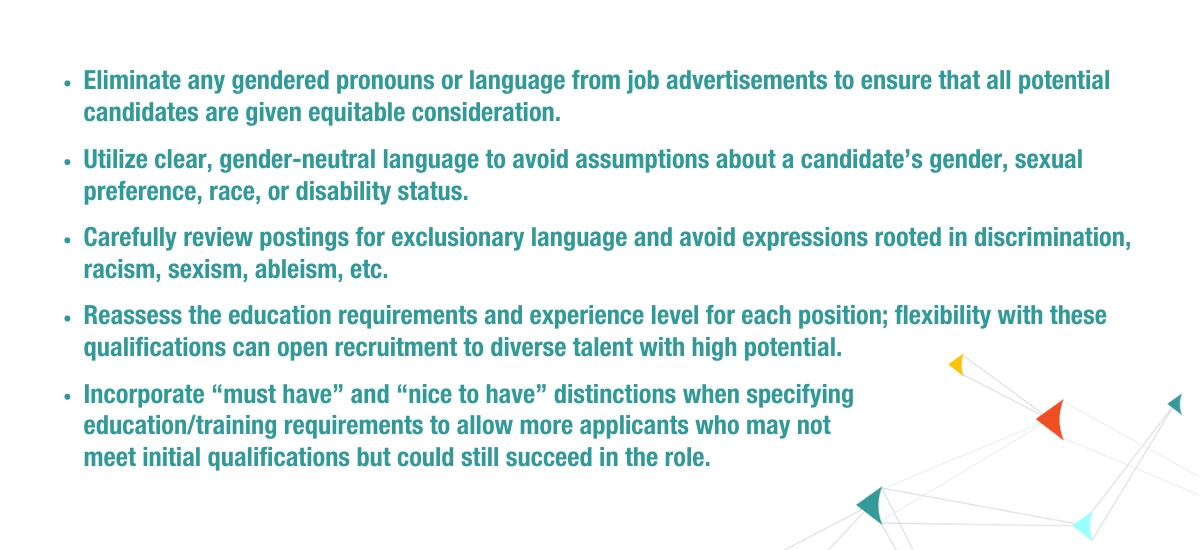Using Inclusive Language to Promote a Diverse Workplace

As an HR leader, establishing an environment that promotes diversity and inclusiveness is crucial for all employees to feel welcomed, respected, and valued. Inclusive language is a significant factor in fostering a positive environment where employees feel they can bring their whole selves to work. By being mindful of what language you use, you ensure your business creates a culture of acceptance and understanding, which, in turn, positively influences employee engagement and attracts new talent to your organization.
Just as technology progresses rapidly, bringing various changes to organizational cultures, so must our dialogue—creating the opportunity to phase out outdated phrases that perpetuate exclusivity or stereotypes. Let’s explore how we can use more inclusive language to create a cohesive work environment for everyone!
Using Inclusive Language to Promote a Diverse Workplace
It’s no longer a platitude to say “words matter”; we have hard evidence that they do. Using inclusive language in the workplace is essential for promoting a diverse and equitable environment. By speaking inclusively to everyone, organizations create a space where all employees feel safe and respected.
Tips for staying mindful of using inclusive language:
- Use gender-neutral terms when referring to teams or individuals (i.e., sales associate instead of salesman)
- Avoid language that makes assumptions or only makes sense to a specific demographic (i.e., sports references)
- Being mindful of the historical context of common phrases (i.e., “rule of thumb”)
Additionally, leadership would do well to recognize that diversity encompasses more than just race and gender but also includes ethnicity, religion, language, sexual orientation, disability status, and socioeconomic status.
Inclusive language helps ensure that people of all backgrounds and identities are respected and included in the workplace. Incorporating inclusive language into the workplace can help create a sense of belonging and a culture of acceptance, respect, and belonging. Organizations should ensure that their language is culturally sensitive and appropriate to all staff members. This can only be accomplished by first recognizing commonly used exclusionary language and actively working to eliminate it from the workplace.

Why is Inclusive Language a Priority?
When forward-thinking leaders start discussing the elimination of divisive or exclusionary language, they’re occasionally met with pushback from one source or another. Those hesitant to change may ask: Why are we suddenly concerned about these phrases? Is this really an issue?
Foster a Sense of Community
It’s conceivable that some individuals in your workplace are not bothered by these examples, but that’s likely because they’re not personally affected by the exclusion that they evoke. The importance of inclusive language is to make everyone feel included, not just those who are deemed the majority. By creating an environment of inclusion and respect through inclusive language, organizations demonstrate their commitment to respecting and recognizing the value of each team member. This ultimately leads to a stronger sense of community within the workplace and increased collaboration between colleagues from different backgrounds.
Additionally, research has shown that having a diverse workforce results in higher innovation levels due to an influx of unique perspectives, leading to improved business outcomes and success.
Improve Your Employer Brand
Not only does inclusive language help your existing team feel understood and respected, but it can also help attract future talent to your organization. Using inclusive language helps all feel welcome in joining your team, and it’s also likely to broaden your candidate pool to a more vast audience.
Companies who request “native English speaker” in their requirements but actually mean “fluent in English” could be unknowingly eliminating top talent from applying.
Similarly, using the words “salesman” instead of “sales representative” or “secretary” instead of “executive assistant” could discourage certain applicants from applying based on stereotypical gender roles.
These simple nuances, at minimum, could feel out of touch and inappropriate. At most, they could cost you a quality hire. Taking the time to familiarize yourself with these subtleties in the workplace is a requirement for quality hiring in 2023.
Inclusive language is vital in creating a diverse and inclusive workplace founded on respect for differing backgrounds. Being aware of your words—and understanding their implications—will enable you to create a workplace that fosters collaboration and innovation while fostering respect, belonging, and acceptance among all colleagues.
Learning to speak with inclusivity is essential for long-term success and helping those around you feel comfortable and included. Download the ebook The Best Hiring Strategies for 2023 today to learn how to bring these concepts into your hiring practice and ensure everyone has an equal opportunity for growth in the workplace.

